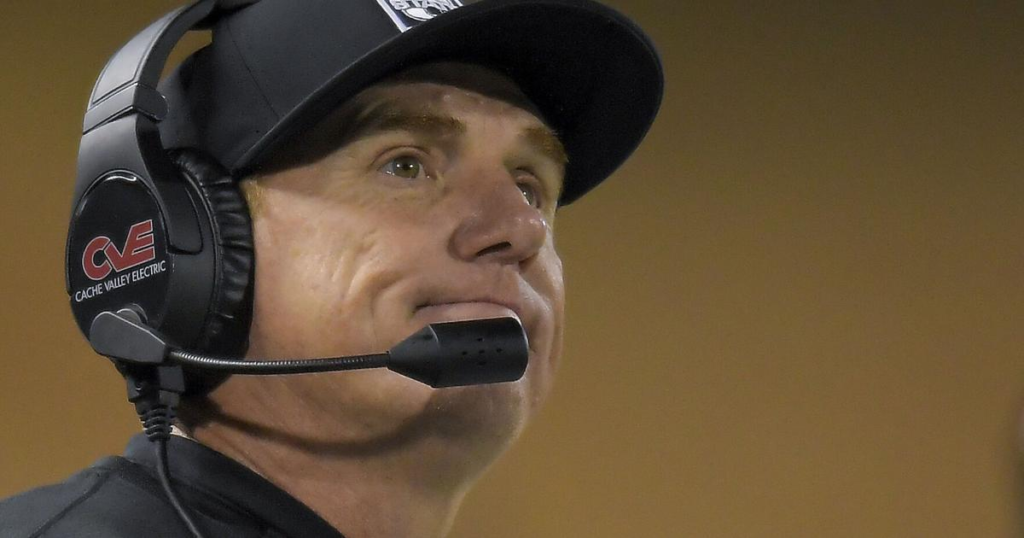Utah State’s termination letter to Blake Anderson says he was fired for contacting a potential domestic violence victim and a witness to the…

LOGAN, Utah (August 11, 2024) — The Utah State University football program has been thrust into turmoil following the firing of head coach Blake Anderson. The decision, which was officially announced on Thursday, has sparked widespread controversy and raised serious questions about Anderson’s conduct off the field. According to a termination letter sent to Anderson, the university cited his inappropriate contact with a potential domestic violence victim and a key witness as the primary reasons for his dismissal.
A Shocking Revelation: The Termination Letter
The termination letter, which was obtained by multiple media outlets, reveals the specific actions that led to Anderson’s abrupt firing. The document states that Anderson was found to have directly contacted a potential domestic violence victim and a witness involved in an ongoing investigation. This contact, according to the university, was deemed highly inappropriate and constituted a serious breach of university policies and ethical standards.
The letter, signed by Utah State University President Noelle Cockett, outlines the university’s rationale for terminating Anderson’s contract. It asserts that his actions not only interfered with the investigation but also potentially jeopardized the safety and well-being of the individuals involved. The letter further claims that Anderson’s conduct demonstrated a “reckless disregard for the integrity of the investigation and the welfare of those involved,” ultimately leading to the decision to fire him.
The Incident: A Timeline of Events
The chain of events that led to Anderson’s dismissal began several weeks ago when the university was made aware of an alleged domestic violence incident involving a member of the football program. While details of the incident remain confidential due to the ongoing investigation, sources close to the situation have indicated that the case involves serious allegations of abuse.
As the investigation unfolded, university officials were notified that Anderson had reached out to the alleged victim and a key witness. The termination letter suggests that Anderson’s intent in contacting these individuals was to gather information and potentially influence the outcome of the investigation. However, the university viewed this contact as an attempt to interfere with the legal process and possibly intimidate those involved.
According to the letter, Anderson’s actions were brought to the attention of university administrators by a third party who became aware of the communications. Upon receiving this information, the university immediately launched an internal review to determine the extent of Anderson’s involvement and assess whether his actions violated university policies.
University’s Response: Upholding Ethical Standards
Following the internal review, the university concluded that Anderson’s actions were unacceptable and warranted immediate termination. In her statement, President Cockett emphasized the university’s commitment to maintaining the highest ethical standards and ensuring the safety of its students and staff.
“Utah State University is dedicated to upholding the principles of integrity, respect, and accountability,” Cockett said. “The actions of Coach Anderson were inconsistent with these values and compromised the integrity of an ongoing investigation. As a result, we have made the difficult decision to terminate his employment.”
Cockett also reiterated the university’s commitment to supporting the individuals involved in the case and ensuring that the investigation is conducted fairly and without interference. “Our priority is to ensure a safe and supportive environment for all members of our community,” she said. “We will continue to work closely with law enforcement and other relevant authorities to ensure that justice is served.”
Blake Anderson’s Response: Denial and Defiance
In the wake of his termination, Blake Anderson has vehemently denied any wrongdoing. In a statement released through his attorney, Anderson claimed that his actions were motivated by concern for the individuals involved and that he had no intention of interfering with the investigation.
“I categorically deny any allegations that I attempted to interfere with or influence the investigation,” Anderson’s statement read. “My only concern was the well-being of those involved, and I reached out in an effort to offer support and guidance. I deeply regret that my actions have been misinterpreted, but I stand by my belief that I acted with the best of intentions.”
Anderson also expressed frustration with the university’s decision, suggesting that he was not given a fair opportunity to explain his actions before being terminated. “I am disappointed that Utah State University chose to terminate my employment without fully understanding the circumstances,” he said. “I intend to challenge this decision and clear my name.”
Legal Ramifications and Potential Consequences
Anderson’s firing has opened the door to potential legal battles between the former coach and the university. Anderson’s attorney has indicated that they are considering all available legal options, including filing a wrongful termination lawsuit. Such a case could lead to a protracted legal dispute, further complicating an already difficult situation for Utah State.
In addition to potential legal action, Anderson’s dismissal could have far-reaching consequences for his coaching career. The nature of the allegations against him, particularly those involving interference in a domestic violence investigation, could make it challenging for Anderson to find future employment in college football or elsewhere.
Impact on Utah State Football Program
The firing of Blake Anderson has left the Utah State football program in a state of disarray just weeks before the start of the 2024 season. The sudden change in leadership has created uncertainty within the team, and there are concerns about how the program will move forward without its head coach.
University officials have not yet announced who will take over as interim head coach, but it is expected that a decision will be made in the coming days. The timing of Anderson’s termination could have significant implications for the team’s preparation and performance during the upcoming season.
Players, alumni, and fans have expressed a range of emotions in response to the news. Some have voiced support for the university’s decision, praising the administration for taking swift action in response to Anderson’s actions. Others, however, have expressed disappointment and concern about the impact this will have on the football program.
Moving Forward: Rebuilding Trust and Stability
As Utah State looks to the future, the university faces the challenge of rebuilding trust and stability within its football program. The firing of a head coach is always a significant event, but the circumstances surrounding Anderson’s dismissal make this situation particularly sensitive.
The university will need to act quickly to appoint new leadership and reassure players, recruits, and supporters that the program remains committed to success on and off the field. In the meantime, the ongoing investigation into the domestic violence incident will continue, with university officials pledging to support the legal process and ensure that justice is served.
For Blake Anderson, the road ahead is uncertain. While he has vowed to fight the allegations and challenge his termination, the fallout from this situation could have lasting effects on his career and reputation. As the situation continues to develop, both Anderson and Utah State University will be closely watched by the college football community and beyond.
Conclusion: A Turning Point for Utah State
The termination of Blake Anderson marks a significant turning point for Utah State University and its football program. The decision to fire a head coach under these circumstances underscores the university’s commitment to upholding its values and protecting the well-being of its community. As the Aggies prepare for the upcoming season, they will do so under a cloud of uncertainty, with the hope that new leadership can guide the program through this challenging time.
The impact of Anderson’s dismissal will likely be felt for years to come, both at Utah State and in the broader college football landscape. Whether Anderson can successfully clear his name and return to coaching remains to be seen, but for now, Utah State must focus on moving forward and rebuilding in the wake of this controversy.









